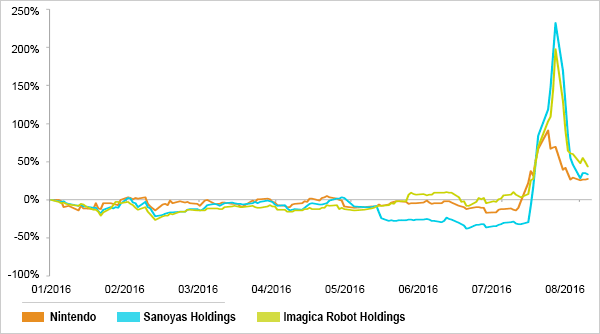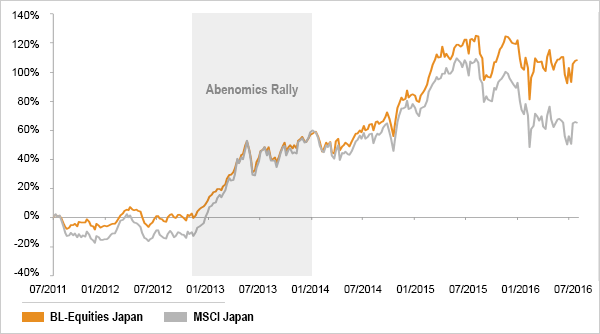Investing in Japan – Thematic investments in light of the Pokémon Go craze
Unless you’ve been living under a rock during the past few weeks, you must have heard about the Pokémon Go phenomenon that has taken the world’s attention by storm. The release of the smash-hit app by Niantic Inc. has not only resulted in global hype, but has also had significant repercussions on the stock market.
Shares of Nintendo, which has a small stake in Niantic and a 32% stake in The Pokémon Company (the company that owns the rights to the Pokémon franchise), have been on a rollercoaster ride and their average daily turnover on the Tokyo stock exchange has multiplied by a factor of 30 after the release of Pokémon Go. The share price more than doubled during the first few days, then plummeted after the company had to play down the financial impact of the game’s success.
Other stocks have also been impacted by Pokémon fever: McDonald's Japan, which distributes Pokémon characters with its Happy Meals, jumped by 25% after the game’s release. First Baking, the baker of "Pokémon Bread", saw its share price increase by 23% and Fuji Media Holdings, which owns a small stake in Niantic, was also up by more than 20%. Sanoyas Holdings, an engineering company whose leisure arm runs Pokémon themed facilities, saw its share price temporarily skyrocket by more than 300%, while shares of Imagica Robot, a producer of Pokémon cartoons, briefly gained almost 200%.
Share prices of Nintendo, Sanoyas and Imagica Robot (ytd)

Source: Bloomberg
While the jury is still out on the potential impact of the game’s success and the Pokémon craze on the financial results of these companies, it is clear that riding these kinds of waves on the stock market means taking big risks. Getting the right timing for such investments (“bets” would probably be a more appropriate term) can turn out to be very frustrating, as short-term news flows result in big market swings. Often investments made during these volatile times are merely speculation on short-term trading gains and are rarely made for the purpose of establishing long-term holdings. As such, company valuations tend to be ignored and prices paid for the investments often prove to be too high over the long run.
Short-term investment themes on the Japanese stock market
Riding such thematic waves is a more common phenomenon on the Japanese stock market than other markets. After decades of disappointments, the mood of many investors has veered away from fundamental investing. Even after the nice rally we’ve enjoyed in the past three years, most global investors are underweight on Japan and shy away from long-term commitments. To gain exposure to the Japanese market, they tend to play certain themes for a while, without paying too much attention to company fundamentals or valuations. The recent Pokémon frenzy, although extreme, is just an example of many others in the past.
In 2003 for example, the SARS outbreak hit Asia and Japanese investors rushed to buy makers of masks and dumped travel-related stocks. In 2008, the spike in crude oil prices prompted investors to buy companies that were somehow connected to the theme of alternative energy. In 2012, the spread of smartphones and the proliferation of social games led to a strong rise in the share prices of game-related companies. In recent years, the rise in foreign tourists visiting Japan has increased demand for transportation and consumer stocks. Although some themes have influenced investor behaviour more than others, they have often resulted in big market swings and unfulfilled expectations.
At BLI - Banque de Luxembourg Investments, we are not trying to capture and ride these waves. Our investment approach leads us to buy companies which benefit from a competitive edge that allows them to create shareholder value over the long term. We also put a big emphasis on company valuation in order to avoid falling into the trap of overpaying for our investments. We do not base our investment decisions on short-term themes and tend to avoid over-hyped stocks that are buoyed by growth expectations that are not sustainable.
Thematic investments at BLI
However, while we don’t actively follow the trend on short-term themes, our individual investments often profit from certain interesting long-term trends:
For export-orientated companies, our Japanese equity fund BL-Equities Japan holds several companies that respond to the themes of industrial automation and the growth in mobile data communication. Industrial and chemical companies like Fanuc, Keyence or Nitto Denko, which have been described in detail in a previous blog entitled “Automation for the people”, are well positioned to benefit from these structural growth themes. Another long-term theme is the rapidly growing middle class in emerging countries, where companies like Pigeon, a leading producer of baby bottles and dummies , and Unicharm, Japan’s leading producer of baby nappies, are well positioned to benefit.
Among companies exposed to the domestic market, the fund’s portfolio includes several companies that are boosted by consolidation in Japan’s retail sector. Ain Holdings, ABC-Mart or Don Quijote are some of the retailers mentioned in an earlier blog entitled “New adventurers in retail”, which gain market share at the expense of smaller competitors. Demographic change is also an important theme in Japan. Secom for example, a virtual monopolist in security systems, benefits from the ageing population as it has expanded its product range to offer services for the elderly.
A key recurring theme on the Japanese stock market is the rotation between sectors more exposed to exports and those more exposed to the domestic economy. Investment switches between these segments are generally based on the outlook for the global economy and the Japanese yen. They can occur suddenly, continue over longer periods of time and heavily influence stock performance. As predicting parameters like currencies, economic data or investor sentiment influencing this sector rotation is very difficult, we have decided that our Japanese fund must always keep a sound balance between domestic and export-orientated companies. This decision is essentially a risk-control measure, as it prevents the fund from being too heavily exposed in either direction. It is the only top-down decision made for the portfolio, the choice of companies included in the two categories being purely based on bottom-up stock picking.
Themes and their impact on fund performance
Apart from this structural choice to balance export and domestic companies, fund performance over the short term can still be heavily impacted by many other themes that influence investor behaviour on the Japanese market. For example, in 2013, the main investment theme playing out in Japan was the monetary policy aspect of Abenomics, resulting in a depreciation of the yen and a decrease in investors’ risk aversion, as I noted in an earlier blog entitled "The impact of Abenomics". Investors have consequently been on the hunt for high-beta and highly leveraged stocks, small caps, and stocks in sectors like brokerage or real estate. None of this played into our hand as our exposure to these categories is structurally low. As a result, BL-Equities Japan trailed the market during this period.
BL-Equities Japan vs. MSCI Japan NR since launch

Source: Bloomberg
Over the short term, it is always possible for performance to be negatively impacted by theme-driven markets but over the long term, we are convinced that stock markets reflect economic realities and that our approach consisting of buying quality companies at reasonable valuations pays. Since the beginning of 2014, BL-Equities Japan has been able to make up the ground lost in 2013, and since its inception in 2011 it has significantly outperformed the market.
Theme-driven markets can also play in your favour: for instance, during the last two years, the focus of Japanese investors has been on the theme of “improvements in corporate governance and shareholder returns”. I described the reasons for this trend in past year's blog entitled "an Emerging Interest in Corporate Governance". Profitable companies that generate large amounts of free cash flow have become the focus of investors’ interests and demand for quality growth stocks has increased. As these are the kind of companies that are the preferred investment candidates for BL-Equities Japan, this theme has certainly helped to contribute to the fund’s excellent performance during this period.
Theme-driven markets as opportunities for investors
As we have seen, in the short term, markets do not always reflect economic realities. On the one hand, stocks can fall out of favour for simply not being in tune with a certain theme, while on the other hand, markets can drive up stock prices purely based on short-term news flow and sentiment. At BLI, as fund managers with a long-term view, we try to use these market movements to our advantage. We can seize opportunities that arise when unloved companies with attractive and sustainable long-term growth prospects become cheap for the wrong reasons. And we can take profits on those popular companies in our portfolio whose valuations have been driven up too far, just because they were responding to a favourable theme. With this contrarian approach, investors might miss out on some short-term investment opportunities and sometimes be on the wrong side of the equation when certain themes play out. But over the long term, this approach should turn out to be reasonably rewarding for investors and help them register better and more sustainable returns than those achieved by following the herd in theme-driven markets.